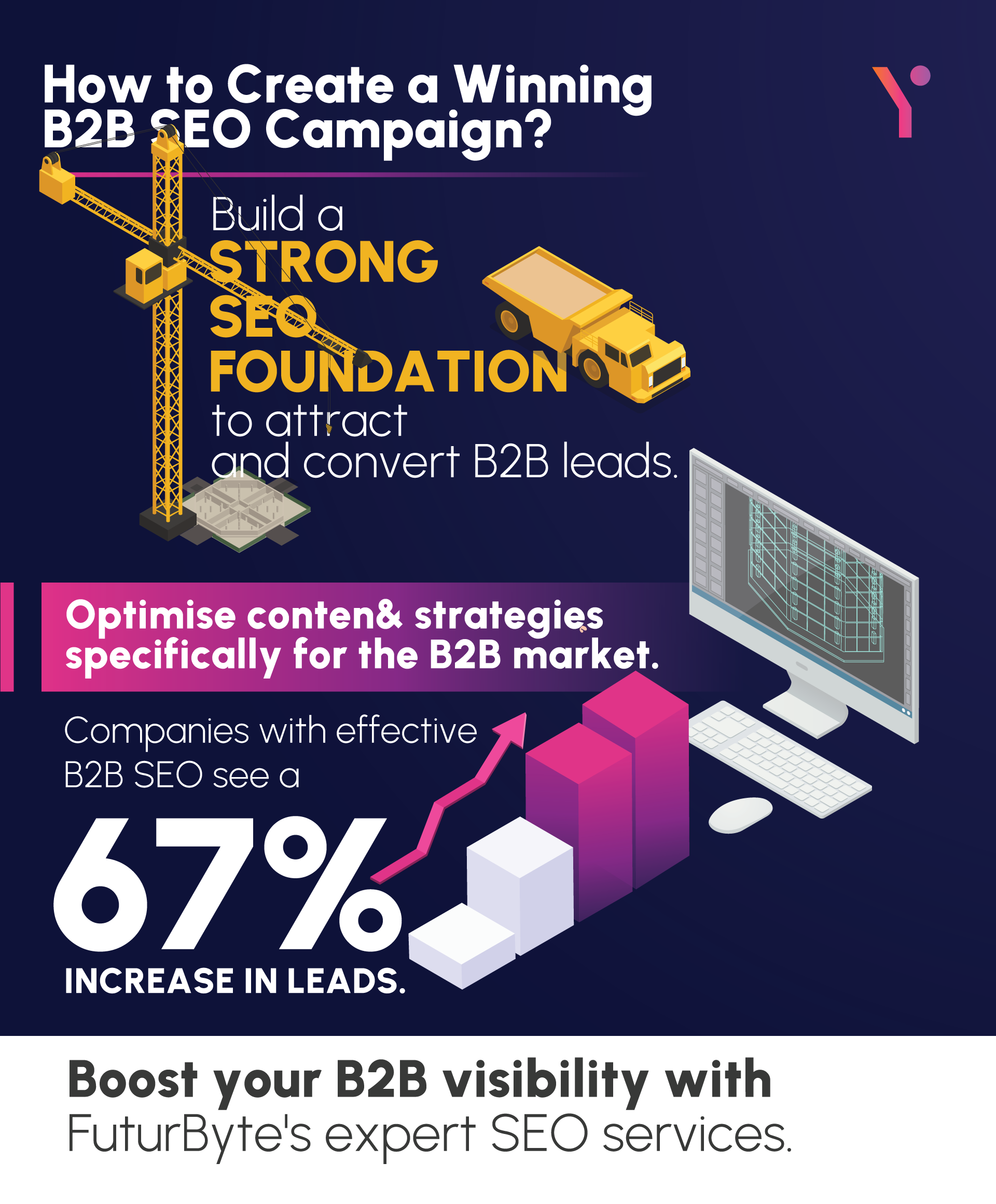Introduction
This blog covers How to Create a Winning B2B SEO Campaign by offering insights into understanding your target audience, selecting effective long-tail keywords, and producing quality content. It also delves into on-page SEO techniques, backlink strategies, and reputation management, all tailored to help B2B businesses rank higher and attract valuable leads.
In 2024, creating a winning B2B SEO campaign requires a deep understanding of your audience more than search engines.
The focal point of a winning SEO strategy is still high-quality content, yet it is crucial to produce content that effectively tackles the problems faced by your audience. No one wants to read lengthy content pieces, so avoid boring your audience; instead, present your content in engaging formats like videos or gifs. Focus on long-tail keywords as they may not generate a lot of traffic, but they can bring in good leads that are more likely to convert.
Beyond content, your online reputation and social media presence are the key factors that have changed the game of modern SEO. In fact, 90% of B2B buyers trust online reviews, making it crucial to actively manage your brand’s reputation.
While we have a lot to discuss in this blog, let’s break it down into actionable steps and see how we can plan our winning B2B SEO campaign.

“Content is fire, social media is gasoline.” — Jay Baer.
What is SEO for B2B?
SEO for B2B search engine optimisation, is about optimising your company’s digital presence and making an effort to rank on the top of SERPs or earch engine rank pages.
Unlike B2C (Business-to-Consumer) SEO, where you target individual customers through content that they want to read and consume, B2B SEO focuses on decision-makers in other companies. The high-ticket target audience is always the decision-makers and C-level profiles.
The objective of B2B SEO is to ensure that your products or services are seen by the right audience, which consists of other businesses actively seeking the solutions you offer.
When planning a successful B2B SEO campaign, it’s important to remember that B2B customers have lengthier buying processes and specific requirements. They aren’t looking for impulse buys; they want in-depth information, comparisons, and proof that your solution fits their requirements. This makes B2B SEO more about building trust and credibility than just driving quick traffic.
You need a solid B2B SEO strategy that helps you outperform your target audience in the long run. Wondering how to create a winning B2B SEO campaign? Connect with our SEO experts and get a custom plan today.
The Importance of a Tailored B2B SEO Campaign
A one-size-fits-all approach won’t cut it. As such, every enterprise differs in terms of its requirements, aims and objectives, as well as the problems it may face. That is precisely why a well-developed and unique B2B SEO campaign is integral for a company.
Properly defined and implemented B2B SEO solutions establish your company as an industry leader and a trusted market player. This presence helps differentiate your services from competitors, attracting potential clients who often rely on what they find on social media platforms like Facebook and Instagram. By tailoring your B2B SEO efforts, you can more effectively present relevant content and utilise the right strategies for business promotion, aligning with what people are searching for online.
Here’s How to Plan a Winning B2B SEO Campaign
Planning is where the magic begins. A winning B2B SEO campaign isn’t something you throw together overnight. Here’s how you can get started.
#1 Know Your Target Audience
Having a solid grasp of your target audience is essential for the success of any B2B SEO strategy. To start with, it is essential to recognise the target audience to establish effective communication. It is more than simply defining the types of business that are of interest to you. Take a closer look at the specific decision-makers inside those enterprises. What challenges do they face? What solutions are they looking for?
Once you clearly understand these specifics, you can create content that directly addresses their pain points. This approach helps you build trust, enhancing your SEO performance far more effectively than aggressive promotion. When you know your audience well, you can identify the keywords it is likely to use, leading to higher search engine rankings.
#2 Find Targeted Keywords and LSIs
Keywords are the backbone of your B2B SEO strategy. However, keyword placement does not simply mean using any keyword; the idea is to use the right keywords that would help funnel the right traffic to your website. Initiate with the general B2B SEO keywords common to your industry and zigzag down to the specific keywords your target would type into the search engine.
Speaking of key terms, Latent Semantic Indexing (LSI) keywords are also important. These are words connected with your key phrases, which allow search engines to define the line and the subject of the material. For instance, if your focus keyword is ‘how to create a winning B2B SEO campaign,’ secondary focus keywords could be ‘B2B SEO technique’ or ‘SEO for business-to-business companies.’
Applying the primary and the most appropriate LSI keywords helps in ranking as well as guarantees the needful content to the target group is provided.
#3 Create a Strategic Content Plan
Content is fundamental to your SEO, especially for B2B. Your content plan should be tactical, focusing on meeting the needs of your target market. Begin by identifying different forms of content that will appeal to the target group, such as blog articles, case studies, white papers, and or videos among others.
Every corresponding article posted online should be created with solution focus in mind, every article should be created to capture the main concern or the main question your target audience have. Not only do you improve your search engine ranking, but you also provide the public with valuable information, positioning your business as an industry expert.
When developing content, keep in mind the keywords and their phrasal equivalents that you selected earlier. Try to seamlessly integrate them into your content to rank your business on these keywords. Finally, don’t forget to properly format each piece of content for on-page B2B SEO, including titles, headings, and meta tags, all of which should be aligned with the selected keywords.
Creating and publishing an effective content plan is crucial for increasing traffic, generating leads, and converting interested individuals into buyers. It is not about creating random content; it is about developing content that offers the best solution to a customer’s problem.
#4 Follow the Best On-Page SEO Practices
On-page SEO is all about making your content as search-engine-friendly as possible. It’s the foundation of how to create a winning B2B SEO campaign. Begin with your page titles and meta description to guide the visitors on what to expect. Ensure that they are concise and persuasive and must include the right keywords.
The next concern is the headers but make sure not to overdo the use of bold text. The main title should be in H1, and other subheadings should be in H2 or H3. The visual hierarchy allows earch engines to easily identify the priority of your content and allows readers to skim through it more easily.
Pay attention to URLs and keep them short, clear, and keyword-rich. Also, link your content to other pages on your site, also called internal linking. This boosts SEO and encourages visitors to stay longer on your website.
Images are another major form of B2B SEO. Make sure that the alt text is optimised and includes your top keyword choice. This can improve your rankings in image searches and provide context to search engines.
Lastly, focus on readability. Avoid long paragraphs, use listing, and organise the content in different sections.
#5 Acquire High-Quality Backlinks
Backlinks can be described as the votes given to your website from other websites. They are also a form of communicating to a search engine that your information is worthy of being ranked high. However, not all backlinks are a boon. This is because, in a B2B SEO campaign, the strategy is usually to go for quality rather than quantity.
For backling, it is best to begin with the websites that are related to your industry, including blogs, websites, publications, and so on. Guest blogging appears to be one of the best options as it helps to get backlinks and show one’s expertise. Another option is to build more valuable assets like a white paper, an extensive guide, and other similar materials that other webmasters would like to refer their readers to.
#6 Capitalise on ORM & Social Media
Social media and ORM are crucial for B2B SEO. ORM involves actively working to improve the digital reputation of your brand. You want the digital world to say good things about your company and services, so work on fostering that positive brand reputation.
On the other hand, social media is another useful way of enhancing your web presence. The strategy involves sharing value-additional posts on platforms like LinkedIn, Twitter, and Facebook to boost website traffic and improve its ranking on search engines.
Yes, integrating social media to your SEO makes use of social media and it goes beyond just publishing posts. It is about sustaining one’s corporate image on online channels to help boost SEO strategy.
#7 Leverage Premium SEO Tools & Analytics
If you want to comprehend how to design a successful B2B SEO campaign correctly, you should use commercial SEO tools and analytics. These are useful in helping you strategise and determine how successful you have been.
First, use keyword research tools to identify B2B SEO keywords relevant to your business. Sites such as SEMrush or Ahrefs can help you identify keywords your competitors have ranked for and opportunities you can tap on.
Metrics that give insights into the effectiveness of SEO are gathered through tools like Google Analytics. These tools let you see which pages of your website are most viewed, where your traffic is coming from, and how the audience is engaging with your posts. This data is also useful when it comes to decision-making based on the outcomes and insights that can help improve strategy.
#8 Target Regions One by One Rather than Local SEO
When aiming for a successful B2B SEO campaign, it is essential to focus on specific regions individually rather than relying solely on local SEO tactics. It gives you the opportunity to distribute content and strategise according to the needs of every market which, in turn, can provide higher effectiveness.
The first step, therefore, is identifying regions that are of benefit to your business. Invest time in market research so you know what the competitors are up to; some B2B SEO keywords may be more relevant in that geographical location, so focus on those. A good understanding of the market will help you publish content that is relevant to the needs and concerns of the target market.
Furthermore, it is always good to work on regional pages or blog posts with content related to localised issues and their corresponding remedies. This not only gives SEO a boost, but also engages the audience since the content is perfectly relevant and interesting for the audience you target.
#9 Claim and Optimise Google My Business Listing
Google My Business (GMB) is a powerful tool for boosting your online presence, especially if your business operates in multiple locations. The primary focus of GMB listing is to make your business appear on local search engine results so that you can acquire more leads by claiming and optimising the listing.
Begin with the basics of displaying the right business information, such as the business name, address, phone number, and website. Consistency is crucial, especially when it comes to SEO, and makes the audience trust the work of the designer.
People usually search business names, products, or services to ensure that you load good images of your business into the GMB profile. Incorporation of visual items within your listing can improve the appearance and help in generating more attention.
#10 Measure & Analyse Campaign Success
The final step in how to construct an effective B2B SEO strategy relates to evaluating your effectiveness. Failure to monitor the effectiveness of the strategies you are applying or the areas that need enhancement makes the efforts and progress unmeasurable.
To begin with, ensure that you have the right objectives and targets (KPIs) for the type of campaign you intend to run. These could be an increase in website traffic from search engines, ranking keywords, conversion rates, or the size of the leads list.
It is also important to analyse your return on investment. Determine the total value that you have spent on your SEO initiatives against the amount of revenues received from such steps. This will help you determine the success of your campaign.
Ensure that while implementing the strategy, you conduct follow-ups and make necessary changes accordingly. If some strategies are not effective, one should not hesitate to switch to another strategy. Once the business and its SEO campaign have gotten off the ground, consistency is the driver of ongoing success in B2B marketing.
Conclusion: Ongoing Optimisation & Future Trends
Developing a successful B2B SEO strategy isn’t just about setting a plan in motion and walking away. It’s an ongoing process that requires constant refinement to stay ahead of the curve. As search engines evolve and competition grows, it’s crucial to regularly adjust your strategies to maintain your position.
Start by keeping a close eye on your SEO metrics. Use tools and analytics to understand what’s working, what needs tweaking, and what might need to be scrapped. Regularly update your content to ensure it’s fresh and relevant while also making sure your website is optimised not just for search engines, but also for the best user experience. This means refining your B2B SEO keywords, updating meta descriptions, and improving your site’s speed.
Looking ahead, stay on top of the latest SEO trends. From voice search and AI-generated content to algorithm changes, being informed and adaptable will help your organisation quickly pivot to retain its competitive edge.
Frequently Asked Questions
Focus on understanding your target audience, choose the right keywords, create valuable content, and regularly update your SEO practices. Stay flexible to adapt to new trends.
Yes, by knowing your audience, crafting clear messaging, using the right channels, and continuously measuring and refining your approach.
The best strategy involves targeting specific keywords, creating high-quality content, optimising your website, and building strong backlinks.
Regularly keep your content updated, enhance website speed, utilise appropriate keywords, and concentrate on creating high-quality backlinks.
Absolutely. With the right strategy and continuous optimisation, you can outrank competitors and attract more business.
Have questions or feedback?
Get in touch with us and we‘l get back to you and help as soon as we can!




